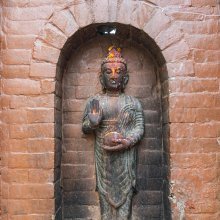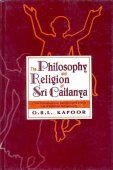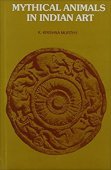Bhagavat, Bhagavan, Bhagavān, Bhāgavat: 27 definitions
Introduction:
Bhagavat means something in Buddhism, Pali, Hinduism, Sanskrit, the history of ancient India, Marathi, Hindi. If you want to know the exact meaning, history, etymology or English translation of this term then check out the descriptions on this page. Add your comment or reference to a book if you want to contribute to this summary article.
Images (photo gallery)
In Hinduism
Pancaratra (worship of Nārāyaṇa)
Source: SriMatham: Vaiṣṇava Iconology based on Pañcarātra ĀgamaThe term Bhagavān indicates the one who possesses Bhaga—the ṣaḍguṇas, or the group of six blessed qualities. They are
- jñāna (knowledge),
- aiśvarya (sovereignty),
- śakti (ability, potency),
- bala (strength),
- vīrya (virility, unaffectedness)
- and tejas (splendour).
Bhagavat (भगवत्) refers to the “Lord”, according to the Ahirbudhnyasaṃhitā, belonging to the Pāñcarātra tradition which deals with theology, rituals, iconography, narrative mythology and others.—Accordingly, “[...] A Brāhmaṇa who is not supported may not act with it (i.e. the kriyāśakti) in this world. But he may perform with it for the good of the world, having first relied upon the King. For the King is the Supreme Being, he embodies all Gods and is all-pervading. He is the base (adhiṣṭhāna) of the Creative Energy belonging to Viṣṇu, and embodies the Lord (bhagavat-maya). [...]”.

Pancaratra (पाञ्चरात्र, pāñcarātra) represents a tradition of Hinduism where Narayana is revered and worshipped. Closeley related to Vaishnavism, the Pancaratra literature includes various Agamas and tantras incorporating many Vaishnava philosophies.
Purana and Itihasa (epic history)
Source: archive.org: Shiva Purana - English Translation1) Bhagavat (भगवत्) refers to “primordial Goddess” and is used to describe the Goddess (Devī), according to the Śivapurāṇa 2.2.12. Accordingly as Brahmā narrated to Nārada:—“[...] with various sorts of prayer [Dakṣa] eulogised and bowed to the Goddess (Devī) mother of the universe, [...] Be pleased, O primordial Goddess (bhagavat), be pleased, O Goddess in the form of Śiva; be pleased, O bestower of boons to the devotees; obeisance be to Thee, O wielder of illusion over the universe.”.
2) Bhagavat (भगवत्) is another name for Viṣṇu, according to the Śivapurāṇa 2.5.16 (“The battle of the gods”).—Accordingly, as Brahmā and the Gods eulogized Viṣṇu: “O Hṛṣīkeśa of long arms, O lord (bhagavat), O slayer of Madhu, O lord of gods, Obeisance to you, O destroyer of all Asuras. [...]”.
Source: Cologne Digital Sanskrit Dictionaries: The Purana Index1a) Bhagavān (भगवान्).—The principal and eternal god;^1 the sum and substance of the three Vedas; bha.— cherisher and supporter of the universe; ga,—the leader or creator; bhaga indicates six properties, dominion, might, glory, splendour, wisdom and detachment; va, elemental spirit in which all beings exist and which exists in all beings; thus it is the name of Vāsudeva.*
- * Viṣṇu-purāṇa VI. 5. 69-79.
1b) A Tuṣita God.*
- * Brahmāṇḍa-purāṇa II. 36. 10.
1c) The quality of bhaga and sadbhāva.*
- * Vāyu-purāṇa 5. 36.
1d) One of Danu's sons.*
- * Vāyu-purāṇa 68. 5.

The Purana (पुराण, purāṇas) refers to Sanskrit literature preserving ancient India’s vast cultural history, including historical legends, religious ceremonies, various arts and sciences. The eighteen mahapuranas total over 400,000 shlokas (metrical couplets) and date to at least several centuries BCE.
Natyashastra (theatrics and dramaturgy)
Source: Wisdom Library: Nāṭya-śāstraBhagavan (भगवन्, “holy one”) refers to a specific “mode of address” (nāman) used in drama (nāṭya), according to Nāṭyaśāstra chapter 19. Bhagavan is used to address the Gods and certain ascetics.

Natyashastra (नाट्यशास्त्र, nāṭyaśāstra) refers to both the ancient Indian tradition (shastra) of performing arts, (natya—theatrics, drama, dance, music), as well as the name of a Sanskrit work dealing with these subjects. It also teaches the rules for composing Dramatic plays (nataka), construction and performance of Theater, and Poetic works (kavya).
Vaishnavism (Vaishava dharma)
Source: Pure Bhakti: Bhagavad-gita (4th edition)Bhagavān (भगवान्) refers to “the Supreme Lord, complete in six opulences: beauty, wealth, strength, fame, knowledge and renunciation. Literally, vān–‘possessor’, bhaga–‘opulence’”. (cf. Glossary page from Śrīmad-Bhagavad-Gītā).
Source: Pure Bhakti: Bhajana-rahasya - 2nd EditionBhagavān (भगवान्) refers to:—The Supreme Lord; the Supreme Personality of Godhead. (cf. Glossary page from Bhajana-Rahasya).
Source: Pure Bhakti: Brhad BhagavatamrtamBhagavān (भगवान्) refers to:—Supreme Lord; the Supreme Personality of Godhead. (cf. Glossary page from Śrī Bṛhad-bhāgavatāmṛta).
Source: Pure Bhakti: Brhad BhagavatamrtamBhāgavat (भागवत्) refers to:—The essential reality of the Supreme Personality. (cf. Glossary page from Śrī Bṛhad-bhāgavatāmṛta).

Vaishnava (वैष्णव, vaiṣṇava) or vaishnavism (vaiṣṇavism) represents a tradition of Hinduism worshipping Vishnu as the supreme Lord. Similar to the Shaktism and Shaivism traditions, Vaishnavism also developed as an individual movement, famous for its exposition of the dashavatara (‘ten avatars of Vishnu’).
General definition (in Hinduism)
Source: Red Zambala: On the Salvific Activities of GodThe 6 attributes of the Lord (Bhagavān) that relate to sentient beings are:
- jñāna = knowledge,
- bālā = strength,
- aiśvarya = sovereignty,
- śakti = omnipotence,
- vīrya = creative potency,
- tejas = splendour.
It is because of these six that He is called ‘Bhagavān.’
In Buddhism
Mahayana (major branch of Buddhism)
Source: Wisdom Library: Maha Prajnaparamita SastraBhagavat (भगवत्) is a synonym for the Buddha according to the 2nd century Mahāprajñāpāramitāśāstra (chapter IV).
Why is he called P’o k’ie p’o (Bhagavat)?:
1) In the word Bhagavat, bhāga means quality (guṇa) and vat indicates its possession: “the one who possesses qualities”.
2) Bhāga means to analyze (vibhāga) and vat indicates skill (kuśala). Skillful in analyzing the general and specific characteristics (svasāmānyalakṣaṇa) of the dharmas, he is called Bhagavat.
3) Bhāga means glory (yaśas-) and vat indicates its possession. Thus this word means “the one who possesses glory”. No-one else has as much glory as the Buddha. The noble Cakravartin kings, Indra, Brahmā, the Lokapālas, are inferior to the Buddha. What then could be said of ordinary men (pṛthagjana)?
4) Bhāga means to crush (bhaṅga) and vat indicates the ability. The person who can crush desire (rāga), hatred (dveṣa) and stupidity (moha) is called Bhagavat.

Mahayana (महायान, mahāyāna) is a major branch of Buddhism focusing on the path of a Bodhisattva (spiritual aspirants/ enlightened beings). Extant literature is vast and primarely composed in the Sanskrit language. There are many sūtras of which some of the earliest are the various Prajñāpāramitā sūtras.
Tibetan Buddhism (Vajrayana or tantric Buddhism)
Source: academia.edu: A Critical Sanskrit Edition and a Translation of Kambala’s Sādhananidhi, Chapter 8Bhagavat (भगवत्) is the name of a deity associated with the syllable “hūṃ” of the Heart Mantra of Heruka (hṛdayamantra): one of the four major mantras in the Cakrasaṃvara tradition, as taught in the eighth chapter of the 9th-century Herukābhidhāna and its commentary, the Sādhananidhi. The Hṛdaya-mantra consists of twenty-two letters. [...] A practitioner in meditation visualizes that twenty-two deities [viz., Bhagavat] are developed from the twenty-two letters constituting the mantra. Each letter of the mantra is used as the initial letter of each deity’s name except for the first and second deities, who are the chief couple deities and located at the center of the maṇḍala.
Source: MDPI Books: The Ocean of HeroesBhagavat (भगवत्) refers to the “Blessed One” and is used to describe Heruka, according to the 10th-century Ḍākārṇava-tantra: one of the last Tibetan Tantric scriptures belonging to the Buddhist Saṃvara tradition consisting of 51 chapters.—Accordingly, “[Vajravārāhī holds] an adamantine knife in the right [hand] and a skull bowl in the left hand; hugs the Blessed One (bhagavat) (Heruka) around [his] hips with [her] two shanks and loves [him]; [has] one face; [has her] hair untied; is naked; is red in color; wears a garland of hairless heads [as a necklace]; is adorned with sexually attractive ornaments; is crowned with a string of skulls on [her] head; [...]”.

Tibetan Buddhism includes schools such as Nyingma, Kadampa, Kagyu and Gelug. Their primary canon of literature is divided in two broad categories: The Kangyur, which consists of Buddha’s words, and the Tengyur, which includes commentaries from various sources. Esotericism and tantra techniques (vajrayāna) are collected indepently.
General definition (in Buddhism)
Source: Buddhist Door: GlossaryThere are many different meanings: one who possesses auspicious signs, one who destroys illusions evil, one who is provided with such auspicious virtues of freedom as the law, fame, good signs, desire and diligence, one who has completely understood the Four Noble Truths, one who receives and keeps various excellent practices, one who has abandoned the wandering of transmigration.India history and geography
Source: Cologne Digital Sanskrit Dictionaries: Indian Epigraphical GlossaryBhagavat.—(ML; CII 3, 4), ‘the lord’ or ‘the divine’; an epithet of divinities such as Viṣṇu, Buddha, Jinendra, Nārāyaṇa, Śiva, the Sun-god, Kārttikeya, etc; also applied to sages, etc. in the sense of ‘venerable’, e. g. to Vyāsa, the arranger of the Vedas; rarely applied to kings apparently on account of their saintliness (cf. Ep. Ind., Vol. XXX, p. 19). Note: bhagavat is defined in the “Indian epigraphical glossary” as it can be found on ancient inscriptions commonly written in Sanskrit, Prakrit or Dravidian languages.

The history of India traces the identification of countries, villages, towns and other regions of India, as well as mythology, zoology, royal dynasties, rulers, tribes, local festivities and traditions and regional languages. Ancient India enjoyed religious freedom and encourages the path of Dharma, a concept common to Buddhism, Hinduism, and Jainism.
Languages of India and abroad
Marathi-English dictionary
Source: DDSA: The Molesworth Marathi and English Dictionarybhagavat (भगवत्).—This is, in Sanskrit, the neuter termination of the adjective bhagavān, or the form in composition of bhagavān (the common name of God); as bhagavatkṛpā Divine favor, bhagavatsattā Divine power, bhagavadicchā The divine will, bhagavatsēvā, bhagavadrūpa, bhaga- vanmāyā, bhagavadbhakti or bhagavadbhajana, bhagavatprāpti, bhagavaddāsa.
Source: DDSA: The Molesworth Marathi and English DictionaryBhagavān (भगवान्).—m (S) The Supreme Being, God.
Source: DDSA: The Aryabhusan school dictionary, Marathi-EnglishBhagavān (भगवान्).—m The Supreme Being, God.
Marathi is an Indo-European language having over 70 million native speakers people in (predominantly) Maharashtra India. Marathi, like many other Indo-Aryan languages, evolved from early forms of Prakrit, which itself is a subset of Sanskrit, one of the most ancient languages of the world.
Sanskrit dictionary
Source: DDSA: The practical Sanskrit-English dictionaryBhagavat (भगवत्).—a.
1) Glorious, illustrious.
2) Revered, venerable, divine, holy (an epithet applied to gods, demigods and other holy or respectable personages); स्वर्गप्रकाशो भगवान् प्रदोषः (svargaprakāśo bhagavān pradoṣaḥ) Rām.5.5.8; अथ भगवान् कुशली काश्यपः (atha bhagavān kuśalī kāśyapaḥ) Ś.5; भगवन् परवानयं जनः (bhagavan paravānayaṃ janaḥ) R.8.81; so भगवान् वासुदेवः (bhagavān vāsudevaḥ) &c.; उत्पत्तिं च विनाशं च भूतानामागतिं गतिम् । वेत्ति विद्यामविद्यां च स वाच्यो भगवानिति (utpattiṃ ca vināśaṃ ca bhūtānāmāgatiṃ gatim | vetti vidyāmavidyāṃ ca sa vācyo bhagavāniti) ||
3) Fortunate (Ved.). -m.
1) A god, deity.
2) An epithet of Viṣṇu.
3) Of Śiva.
4) Of Jina.
5) Of Buddha.
Source: Cologne Digital Sanskrit Dictionaries: Shabda-Sagara Sanskrit-English DictionaryBhagavat (भगवत्).—mfn. (-vān-vatī-vat) Respectable, worshipful, adorable, and hence the common appellative of a prince or deity. m. (-vān) One of the generic titles of a Jina or Jaina deified sage. f. (-vatī) 1. A name of Gauri. 2. Any goddess. E. bhaga fortune, supremacy, &c., and matup poss. aff.
Source: Cologne Digital Sanskrit Dictionaries: Monier-Williams Sanskrit-English Dictionary1) Bhagavat (भगवत्):—a etc. See p. 743, col. 3.
2) [=bhaga-vat] [from bhaga > bhaj] 1. bhaga-vat ind. like a vulva, [Viṣṇu-smṛti, viṣṇu-sūtra, vaiṣṇava-dharma-śāstra [Scholiast or Commentator]]
3) [v.s. ...] 2a mfn. See below.
4) [from bhaj] 2b mfn. (for 1. See under bhaga) possessing fortune, fortunate, prosperous, happy, [Ṛg-veda; Atharva-veda; Gṛhya-sūtra; Bhāgavata-purāṇa]
5) [v.s. ...] glorious, illustrious, divine, adorable, venerable, [Atharva-veda] etc. etc.
6) [v.s. ...] holy (applied to gods, demigods, and saints as a term of address, either in [vocative case] bhagavan, bhagavas, bhagos cf. [Pāṇini 8-3, 1], [vArttika] 2, [Patañjali, and viii, 3, 17] f. bhagavatī m. [plural] bhagavantaḥ; or in [nominative case] with 3. sg. of the verb; with Buddhists often prefixed to the titles of their sacred writings)
7) [v.s. ...] m. ‘the divine or adorable one’, Name of Viṣṇu-Kṛṣṇa, [Bhagavad-gītā; Bhāgavata-purāṇa]
8) [v.s. ...] of Śiva, [Kathāsaritsāgara]
9) [v.s. ...] of a Buddha or a Bodhi-sattva or a Jina, [Buddhist literature] (cf. [Monier-Williams’ Buddhism 23])
Source: Cologne Digital Sanskrit Dictionaries: Monier-Williams Sanskrit-English DictionaryBhagavan (भगवन्):—[from bhaj] in [compound] for vat.
Source: Cologne Digital Sanskrit Dictionaries: Yates Sanskrit-English DictionaryBhagavat (भगवत्):—[(vān-vatī-vat) a.] Respectable, adorable. m. One of the titles of a Jaina. f. A goddess.
Source: DDSA: Paia-sadda-mahannavo; a comprehensive Prakrit Hindi dictionary (S)Bhagavat (भगवत्) in the Sanskrit language is related to the Prakrit word: Bhaṃta.
[Sanskrit to German]
Sanskrit, also spelled संस्कृतम् (saṃskṛtam), is an ancient language of India commonly seen as the grandmother of the Indo-European language family (even English!). Closely allied with Prakrit and Pali, Sanskrit is more exhaustive in both grammar and terms and has the most extensive collection of literature in the world, greatly surpassing its sister-languages Greek and Latin.
Hindi dictionary
Source: DDSA: A practical Hindi-English dictionaryBhagavān (भगवान्):—(nm) God, the Lord Almighty; —[ke ghara jānā/—ko pyārā honā] to go to one’s heavenly abode, to pass away, —[bhalā kare] may God bless you !, God help you ! —[kī icchā] as God wills !
...
Kannada-English dictionary
Source: Alar: Kannada-English corpusBhagavan (ಭಗವನ್):—[noun] = ಭಗವಾನ್ [bhagavan].
--- OR ---
Bhagavān (ಭಗವಾನ್):—
1) [noun] a rspectful term used in addressing a deity or reverential man.
2) [noun] Gautama Buddha, the founder of Buddhism.
Kannada is a Dravidian language (as opposed to the Indo-European language family) mainly spoken in the southwestern region of India.
See also (Relevant definitions)
Starts with (+131): Bhagavacchastra, Bhagavad-gita, Bhagavaddrisha, Bhagavadvahana, Bhagavadvakya, Bhagavanmaya, Bhagavat gosvamin, Bhagavata, Bhagavata krishna kavi, Bhagavata Purana, Bhagavata shankhya, Bhagavata trivikrama, Bhagavata vallata, Bhagavata vinitadeva, Bhagavata vinka, Bhagavata-tatparya-nirnaya, Bhagavatabhavarthadipika, Bhagavatacampu, Bhagavatacandracandrika, Bhagavatachampu.
Ends with: Pravibhagavat, Sauryabhagavat, Shri shri bhagavat, Shrivarabodhibhagavat, Vibhagavat.
Full-text (+2058): Bhanta, Bhagos, Bhagavati, Bhagavata, Bhagavanama, Bhagavannamavali, Bhagavannamakaumudi, Bhagavannamamritarasodaya, Bhagavannamamahatmyasamgraha, Bhagavannamamahatmya, Bhagavanandasamvada, Bhagavannandasamvada, Bhagavannamasmaranastuti, Bhagavanamamahatmyasamgraha, Bhagavanmanapuja, Yogamaya, Bhagavamaya, Mahabhagavata, Bhagavatsvatantrata, Bhagavattattvamanjari.
Relevant text
Search found 176 books and stories containing Bhagavat, Bhaga-vat, Bhagavan, Bhagavān, Bhāgavat; (plurals include: Bhagavats, vats, Bhagavans, Bhagavāns, Bhāgavats). You can also click to the full overview containing English textual excerpts. Below are direct links for the most relevant articles:
Brihad Bhagavatamrita (commentary) (by Śrī Śrīmad Bhaktivedānta Nārāyana Gosvāmī Mahārāja)
Verse 2.2.164-165 < [Chapter 2 - Jñāna (knowledge)]
Verse 2.3.116 < [Chapter 3 - Bhajana (loving service)]
Verse 2.3.160 < [Chapter 3 - Bhajana (loving service)]
Shrimad Bhagavad-gita (by Narayana Gosvami)
Verse 4.1 < [Chapter 4 - Jñāna-Yoga (Yoga through Transcendental Knowledge)]
Verse 4.9 < [Chapter 4 - Jñāna-Yoga (Yoga through Transcendental Knowledge)]
Verse 18.63 < [Chapter 18 - Mokṣa-yoga (the Yoga of Liberation)]
Srila Gurudeva (The Supreme Treasure) (by Swami Bhaktivedanta Madhava Maharaja)
The Sampradaya (disciplic succession) < [Chapter 1.1 - Śrī Guru Tattva and Śrī Guru Sevaka]
Family Duties < [Chapter 1.3 - The Preaching of Śrī Narottamānanda Prabhu to Śrīla Gurudeva]
Talking with the Learned Scholar Vaṃśaropaṇa Siṃha < [Chapter 1.5 - Back to Home Village]
Maha Prajnaparamita Sastra (by Gelongma Karma Migme Chödrön)
The Śāriputra-siṃhanāda-sūtra < [Part 2 - Understanding dharmatā and its synonyms]
Appendix 14 - The appearance of the Buddha and the flower of an Udumbara < [Chapter VIII - The Bodhisattvas]
Act 9.3: Question of the bodhisattva Samantaraśmi < [Chapter XV - The Arrival of the Bodhisattvas of the Ten Directions]
Reverberations of Dharmakirti’s Philosophy (by Birgit Kellner)
Related products




